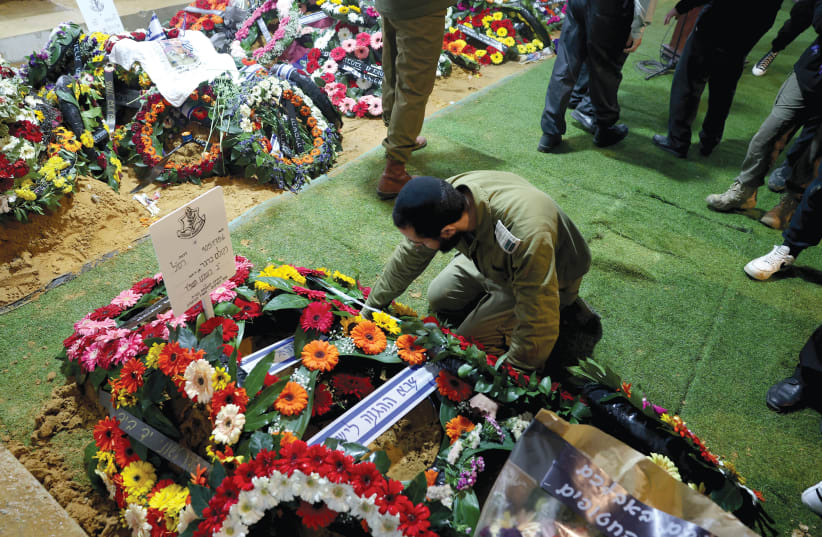There is a sacred covenant between us Israelis and our government and the army. We work, pay taxes, obey the law, do military service, and are good citizens. In turn, the government and the army provide services and protect us from harm.
On October 7, that covenant was violated – smashed to pieces. Women, children, elderly were massacred or taken hostage by murderous terrorists.
Many thousands have had to leave their homes and remain refugees in their own country. It was not supposed to happen. And now, together, we are trying to reassemble the broken pieces of Humpty Dumpty – our feelings of security and trust.
The result is a nation in trauma.
Many burning questions arise. Here are a few, with some tentative answers.
What is PTSD – post-traumatic stress disorder?
PTSD occurs when a person experiences or witnesses disturbing or life-threatening events and has flashbacks, nightmares, anxiety, or depression that intrude often into daily life and become debilitating. For more than four months, the mass media have daily shown us the horrors of October 7 and its aftermath.
How widespread is post-October 7 trauma?
Israelis are known for their resilience. We’ve been at war all too often. We continue to function in tough times. But the level of angst and anguish at present is unprecedented. Many struggle with lack of motivation, lack of concentration, and a general feeling of “being in a fog” – signs of psycho-trauma.
A study by the Israeli Pediatric Association reports that 83% of Israeli children suffer from emotional distress since October 7. And a study in a leading medical journal The Lancet revealed that “those directly exposed to the [October 7] attack or had loved ones involved...were most vulnerable.”
Dr. Ortal Buchnik Atzil, an educational psychologist at the Ruppin Academic Center, examined the emotional consequences of the war among families on the home front in Israel. She focused on symptoms of anxiety among mothers and their children a month after the massacre on October 7 and the beginning of the Swords of Iron war. In an as yet unpublished study, she found that some 60% of mothers and 60% of children showed distress. (See box.)
Dr. Shmuel Hirschmann, head of the Mental Health Directors Forum, says that “the events of October 7 result in an estimated 300,000 additional patients who require treatment by a trained professional.” A Tel Aviv University study suggests that 23% of Israelis reported higher levels of stress. The same study reported on levels of stress in Israel “three times higher than the rate of Americans who suffered from post-traumatic stress disorder after 9/11.
Should we try to hide the horrors of October 7 from our kids? How can we mitigate the distress of our children?
“Many parents take the position that in order to protect their children, they should avoid exposing them to information about the war and avoid talking about the events,” Dr. Buchnik Atzil notes. “Some families even chose not to send their children to the educational frameworks when they returned [reopened] for fear that they would reveal information about the situation there. However, our study shows that children who returned to a learning setting face to face showed less distress symptoms than children who returned only online. Moreover, we found that providing information about the war helped the children cope with the distress they felt.
“When we looked at children starting from the age of two, we saw that as they got older, their level of interest about the war increased, and they asked their parents more questions about it,” she observed. “Correspondingly, these children showed a higher level of knowledge about what is happening in the war. The high level of knowledge was related to a lower level of distress in the children.
“Also, among children aged two to 10, we saw an interesting phenomenon. Among the children whose parents did not talk to them about the war, a strong connection was found between the mother’s anxiety and the child’s level of distress; the meaning is that a mother who feels anxious transmits the distress to her children non-verbally. Such a connection between the mother’s anxiety and the child’s distress was not found among the children whose parents spoke to them, mediated reality for them, and provided them with information about the war.
“Our findings clearly show that young children ‘feel’ their parents and react themselves with distress when their parents feel anxious. Our research shows that providing information to the child, in a sensitive and age-appropriate manner, helps children reduce the feeling of distress. It is important to make sure to adapt the conversation to the child’s age, to answer questions in a simple and clear way, without providing a lot of information that could cause [emotional] flooding.”
Do soldiers returning from fierce fighting in Gaza suffer post-trauma?
Many have already. Dr. Hirschmann admits that “it is not yet known how many of those fighting in Gaza will suffer post-war trauma.”
Amos Harel, military correspondent of the daily Haaretz, wrote that the present war is unusual “in its relatively high number of casualties, in the nature of the combat – taking place in densely populated areas, some of it conducted underground [in tunnels] – as well as in the horrors of war, with stories of captivity and abuse committed against hostages by Hamas and the killing and destruction left in the wake of the IDF’s campaign… In some combat units, the number of soldiers who have pulled out due to mental issues is higher or equal to the number of soldiers who were wounded in battle.”
Are there sufficient professionals to provide skilled treatment?
Not by a long shot. There are about 16,000 registered psychologists in Israel. Some 5,000 provide services in the public sector. This is far from what is needed.
According to the Health Ministry, the number of psychiatrists in Israel has fallen by 20% over the past decade; Israel now has one psychiatrist in public service for every 11,705 persons. And more than two-thirds of psychiatrists were over the age of 55 in 2021. Waiting times can be over a year or more, owing to “a mass exodus into the private sector.”
Minister of Health Uriel Busso told the Jewish News Syndicate that “the country’s mental health system has been neglected for years.” As Israel faces “its most serious mental health event” in its history, “we are all in a certain state of anxiety, we are all traumatized now.”
What can we Israelis do on our own to avoid post-trauma?
Professor Mooli Lahad is Israel’s leading expert on coping and resilience and has been working in this area for almost 50 years. His BASIC Ph model lists six ways to cope with stress.
“The more of these styles we are able to utilize, the more resilience we are able to harness in order to regain a sense of control in an otherwise terrifying situation,” he wrote.
The six are:
- B Belief: Faith, inner core values. I myself have found great comfort in our Masorti congregation in Zichron Ya’acov.
- A Affect: By expressing emotions, we share fears, anger, sorrow, etc. Talking through anguish with friends and family helps.
- S Social: Seeking friendship helps us to stay grounded and decreases isolation.
- I Imagination: Children are especially good at coping, by expressing their thoughts and feelings in a creative manner – e.g., through art, drama, music.
- C Cognitive: Utilizing problem-solving, strategizing with others, can make us feel less alone and more in control.
- Ph Physical: Physical activity helps release feelings in an indirect way. (I do a lot of walking and running.)
ISRAEL CAN learn from Britain, as it went to war in 1940. Winston Churchill became prime minister in June, leading an all-party coalition. He made three famous, defiant speeches:
On May 13 (“Blood, sweat and tears”); June 4 (“We shall fight them on the beaches”); and then on June 16. Here is what he said on June 16 to Britain’s Parliament just after France capitulated to the Nazis, almost without a fight:
“If we fail, the whole world… will sink into the abyss of a new Dark Age.… Let us therefore brace ourselves to our duties, and so bear ourselves, that if the British Empire and the Commonwealth last for a thousand years, men will say, ‘This was their finest hour!’”
Israel’s Prime Minister Benjamin Netanyahu is no Churchill. His self-serving manipulations are the diametric opposite. Despite him, this is Israel’s finest hour. Our finest hour is how we will – we must – remember it.
We fight not only for ourselves but for the free world as Churchill’s Britain did. A survey published by the French newspaper Le Figaro revealed that 72% of the French people fear a terror attack in France, similar to October 7.
Up to 10% of France’s metropolitan population is Muslim, and 30% of the Alsace city of Strasbourg. Failure to eradicate Hamas terror may engender copycat terror all over the world.
The trauma of the Hamas attack on October 7 and the ensuing anguish can and will become traumatic growth (positive psychological changes experienced as a result of the struggle with trauma) rather than post-trauma stress as we Israelis and supportive Jews (and non-Jews) abroad unite to build a new, dynamic, and democratic Israel. ■
The writer heads the Zvi Griliches Research Data Center at S. Neaman Institute, Technion. He blogs at www.timnovate.wordpress.com.

